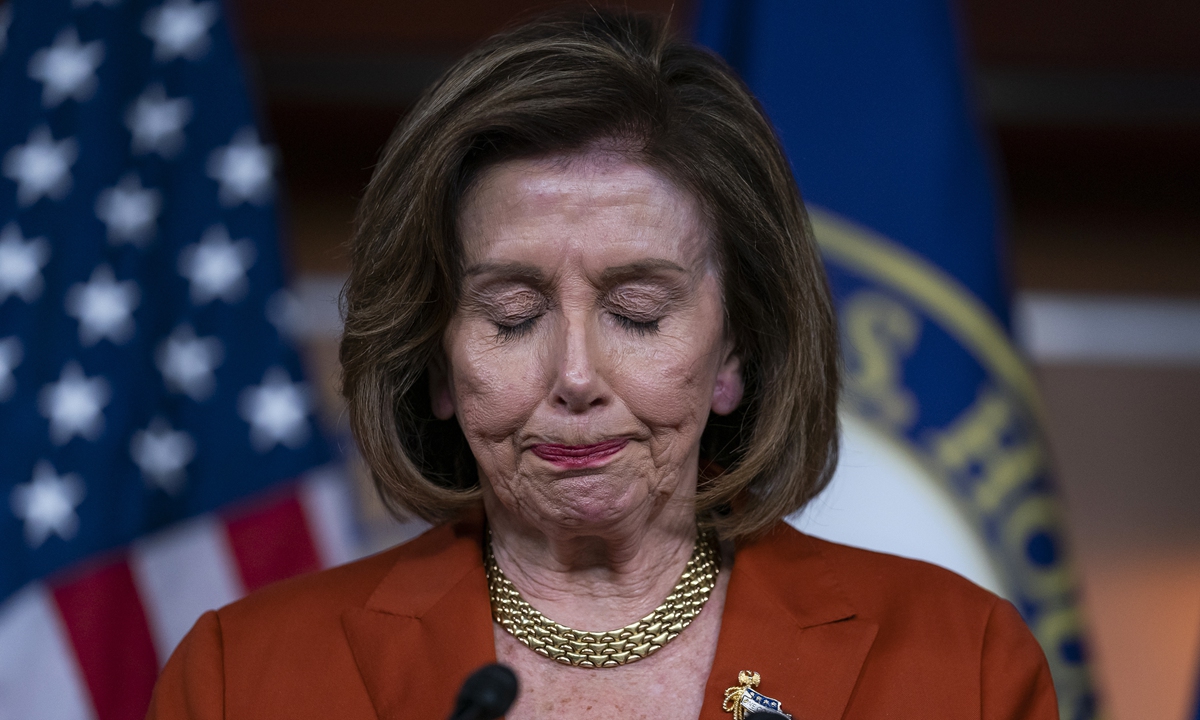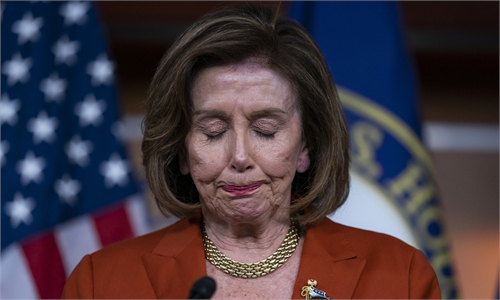Pelosi's provocative Taiwan visit lashed out by mainstream US media, intl politicians
Ball in US court to make sincere moves to improve ties, otherwise bilateral relations risk escalation: experts

Speaker of the US House of Representatives Nancy Pelosi Photo: VCG
Although US House Speaker Nancy Pelosi concluded her reckless visit to the island of Taiwan, the aftershock hasn't stopped. And she has already scuttled China-US relations. More and more voices from within the US and other countries have criticized the 82-year-old woman's Taiwan trip as "irresponsible," saying it was for her personal gains. Meanwhile, the Biden administration, instead of offering acceptable explanation of Pelosi's provocative trip, has kept blaming China for "escalating tensions," and portraying the US as well as the island of Taiwan as "victims." Observers said such moves show Washington has no sincerity of averting the current tension between itself and Beijing, and risk pushing the bilateral relation into a deeper abyss.
As countermeasures against Pelosi's provocative visit, China halted cooperation with the US on a range of key fields, including military and climate change. Experts believe now the ball is in US court - if the US government can make positive gestures on the Taiwan question, as well as on other matters that are of core interests to China, it may save China-US relation from further deterioration; and if bilateral relations keep spiraling down, it is solely US' fault.
The New York Times published an editorial piece on Saturday entitled "The US Relationship with China Does Not Need to be So Tense." The article called Pelosi's visit to the island of Taiwan as "provocative," and noted, "It is in everyone's interest for the two most powerful nations on Earth to find ways of easing these tensions."
Max Baucus, former US ambassador to China, told the Sky News on August 2 that Pelosi was behaving "recklessly" and "dangerously" simply to "get a little publicity" by visiting Taiwan.
Internationally, not only more and more countries have voiced their supports for the one-China principle, others also chided Pelosi for her meaningless trip. Former prime minister of New Zealand John Key has described the visit to Taiwan by US house speaker Nancy Pelosi as "reckless, provocative and dangerous.''
"In my opinion it was reckless, if you want to be kind. It was provocative, and it was actually dangerous," Key said on TVNZ's program media reported on Sunday.
"We all have skin in this game and want America and China to get along," Singapore's foreign minister Vivian Balakrishnan said on the sidelines of an ASEAN meeting in Cambodia on Friday. "This is a dangerous, dangerous moment for the whole world."
Chinese experts believe the voices of some US media and the international world are noteworthy. "It became obvious even in the eyes of usually hostile US media that Pelosi's visit is an act that makes her personal interest override the national interest, and it is obviously a decision that put the US in a hard-pressed situation," Zhang Tengjun, deputy director of the Department for Asia-Pacific Studies at the China Institute of International Studies, told the Global Times on Sunday.
Further provocations
Yet, some US politicians, instead of trying to improve the precarious situation, are deliberately playing dumb and playing the "victim card."
White House national security spokesperson John Kirby said on Friday that the US had nothing to rectify regarding Pelosi's visit to Taiwan, and claimed that Washington "would like to see tensions with China come down immediately but that Beijing's move to suspend some communication channels was irresponsible."
China on Friday announced eight countermeasures in response to Pelosi's highly provocative visit to the island of Taiwan, including canceling China-US theater commanders talk, defense policy coordination talks, military maritime security consultative mechanism and suspending cooperation on illegal immigration repatriation, drug control and climate change.
Speaking at an online news conference with his Philippine counterpart in Manila, US secretary of state Antony Blinken said China should not hold talks on important global matters such as the climate crisis "hostage."
Lü Xiang, research fellow at the Chinese Academy of Social Sciences, said on Sunday it is US customary trick of acting as "victims," as "the US knows that they bungled the whole thing, and now they are acting like a victim to shift blame on China."
Such countermeasures, according to Lü, give the US a "cooling period" to reflect why Washington has pushed the bilateral relations to what and where it is right now. "We used to conduct frequent communication on various fields, such as drug control and climate change. But instead of cooperating with China, the US slapped sanctions on China in energy fields. Instead, all those negotiations end up with little progress… Now it's time to leave the US to reflect," said Lü.
Zhang also said that since Biden took office, he has been instigating tensions across the Taiwan Straits by selling weapons and also signed bills that tried to help Taiwan separatists get WHA observer status "It's safe to say that Biden's move interplayed with hostile forces in his government that insisted on playing the 'Taiwan card,'" Zhang noted.
For weeks, US officials from the president on down have tied themselves into knots trying to talk about Pelosi's choice to visit Taiwan, and stressing that it was her decision, and hers alone, according to CNBC.
Experts believe the US is feigning ignorance. The US has been using separation of powers as an excuse to claim that the US president has no power over the house speaker, but China won't buy that trick, said Zhang. He noted that anyone who has the basic knowledge of US politics know that there are negotiations within the government, not to mention that Pelosi belongs to the same party as Joe Biden.
Ball in US court
Chinese experts believe the halt of exchange mechanisms won't be resumed anytime soon, and the ball is in US court now, and the US has to show sincerity of correcting their wrongdoings, show respect to China on its core interests, and create conditions for bilateral communication.
Zhang said that the Biden administration should make a clearer statement on the Taiwan question, as well as other key issues, "clearer than what he and other high-level US officials have previous made public, to show China that it is sincere in improving bilateral ties, and willing to stop provocations."
On August 1, the day before Pelosi landed on the island of Taiwan, the White House said that nothing had changed about America's "one-China" policy, and that Washington does not support "Taiwan independence."
Yet Pelosi's provocative visit has already created a chain reaction, said Zhang, citing that a Lithuanian delegation headed by Transport and Communications Vice Minister Agne Vaiciukeviciute already arrived in Taiwan for visit on Sunday, and that reports have it that Britain's House of Commons foreign affairs committee is also planning a visit to the island later this year.
Pelosi's visit has kicked off a really bad start, said Zhang. He noted that it has encouraged other countries to elevate their exchanges with the island of Taiwan to a new level, which cast bad influence and will definitely invite China's fierce fight back.
No matter how such negative influence will make the China-US relations deteriorate or send shock waves to the region, the onus is always on Washington, not Beijing, Zhang remarked.

